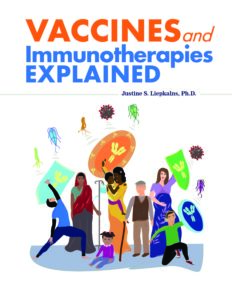 As part of the Program for Research in Immunology and Microbiology Education (PRIME) group, the Liepkalns laboratory studies and develops tools to help faculty teach immunology more effectively. With exciting advances in immunotherapies (including novel vaccine designs), immunology has become a topic many want to learn more about. What should students learn by the time they graduate from college (scientific literacy) and how do students develop their understanding of these immunological concepts? We are interested in making students self-directed learners and developing tools for instructors. We are particularly interested in students that are underrepresented in the field of immunology and are working to make this field more inclusive to all learners.
As part of the Program for Research in Immunology and Microbiology Education (PRIME) group, the Liepkalns laboratory studies and develops tools to help faculty teach immunology more effectively. With exciting advances in immunotherapies (including novel vaccine designs), immunology has become a topic many want to learn more about. What should students learn by the time they graduate from college (scientific literacy) and how do students develop their understanding of these immunological concepts? We are interested in making students self-directed learners and developing tools for instructors. We are particularly interested in students that are underrepresented in the field of immunology and are working to make this field more inclusive to all learners.
Another project is publishing textbooks on immunology for undergraduate students with expert colleagues by integrating evidence-based approaches. The 1st edition of “Vaccines and Immunotherapies Explained” is now available!
research project
Undergraduate Immunology fundamental statements and skills
In collaboration with a team of immunology educators nationwide, referred to as ImmunoReach, we are developing undergraduate curriculum guidelines for teaching immunology. We are using the National Science Foundation’s report Vision and Change as a framework to align immunology undergraduate literacy with core biological concepts and skills.
research project
Conceptual Learning in Immunology & Microbiology (CLIMb)
We are developing a conceptual framework outlining how novice students develop expertise in immunology. This tool can reveal the roadmap students usually take when deepening their understanding of a core immunological concept and instructors can design their assessments and curriculum accordingly.
Publications
Vaccines and Immunotherapies Explained.
Justine Liepkalns
Kendall Hunt Publishing. ISBN 9781792498725.
Impact of automated response systems on in-class cell phone use.
Moorleghen DM, Oli N, Crowe AJ, Liepkalns JS, Self CJ, Doherty JH.
Biochem Mol Biol Educ. 2019 Sep;47(5):538-546. doi: 10.1002/bmb.21257. Epub 2019 May 30. PMID: 31145544
Making evolution stick: using sticky notes to teach the mechanisms of evolutionary change.
K. Grogan, T. Lee, and J. Liepkalns.
Evolution: Education and Outreach. 10:11. 2017
Thomas Henry Huxley Award.
Virus-Detection Kits and Methods of Making and Using the Same.
R. Zafari, B. Goldstone, J. Liepkalns
United States Patent and Trademark Office. Publication # US-2016-0131650-A1
An Undergraduate Authentic Research Experience
Rapamycin does not Impede Survival or Induction of Antibody Responses to Primary and Heterosubtypic Influenza Infections in Mice.
Liepkalns J, Pandey A, Hofstetter A, Jones E, Cao W, Liu F, Levine M, Sambhara S, Gangappa S.
Viral Immunology. (2016) 29(8):487-493.
more publications
news and updates
view all
November 10, 2018
2018 T.H. Huxley Award Winner ‘Making evolution stick: using sticky notes to teach the mechanisms of evolutionary change’
Three Emory University instructors won for a student-centered, active learning approach they developed using sticky notes to teach evolutionary mechanisms of natural selection, gene flow, population bottlenecks, and genetic drift.
October 15, 2014
USA Today: Emory University students developing fast-acting Ebola detection strips
Two freshman pre-med Emory University students developed Rapid Ebola Detection Strips (REDS), a portable test strip kit, that will be licensed for distribution in 2015.
October 1, 2014
Saporta Report: Field test for Ebola devised by Emory students who now seek crowdfunding
As the nation focuses on a case of Ebola in a Texas hospital, two students at Emory University are raising money to develop a test they think could identify the virus in the field.
 As part of the Program for Research in Immunology and Microbiology Education (PRIME) group, the Liepkalns laboratory studies and develops tools to help faculty teach immunology more effectively. With exciting advances in immunotherapies (including novel vaccine designs), immunology has become a topic many want to learn more about. What should students learn by the time they graduate from college (scientific literacy) and how do students develop their understanding of these immunological concepts? We are interested in making students self-directed learners and developing tools for instructors. We are particularly interested in students that are underrepresented in the field of immunology and are working to make this field more inclusive to all learners.
As part of the Program for Research in Immunology and Microbiology Education (PRIME) group, the Liepkalns laboratory studies and develops tools to help faculty teach immunology more effectively. With exciting advances in immunotherapies (including novel vaccine designs), immunology has become a topic many want to learn more about. What should students learn by the time they graduate from college (scientific literacy) and how do students develop their understanding of these immunological concepts? We are interested in making students self-directed learners and developing tools for instructors. We are particularly interested in students that are underrepresented in the field of immunology and are working to make this field more inclusive to all learners.





